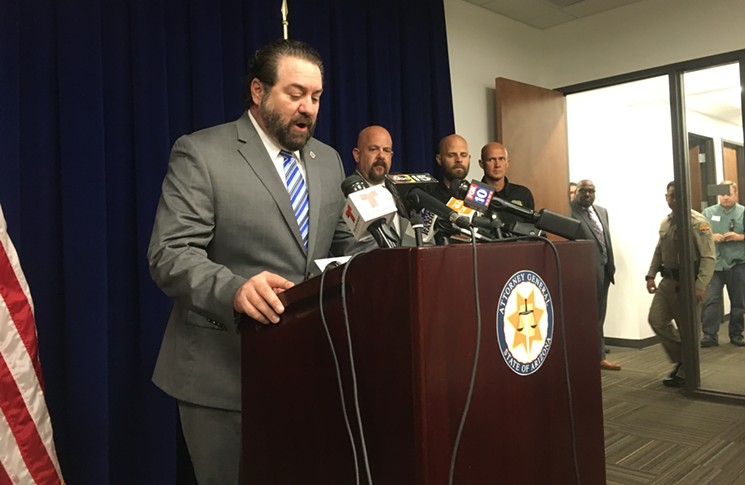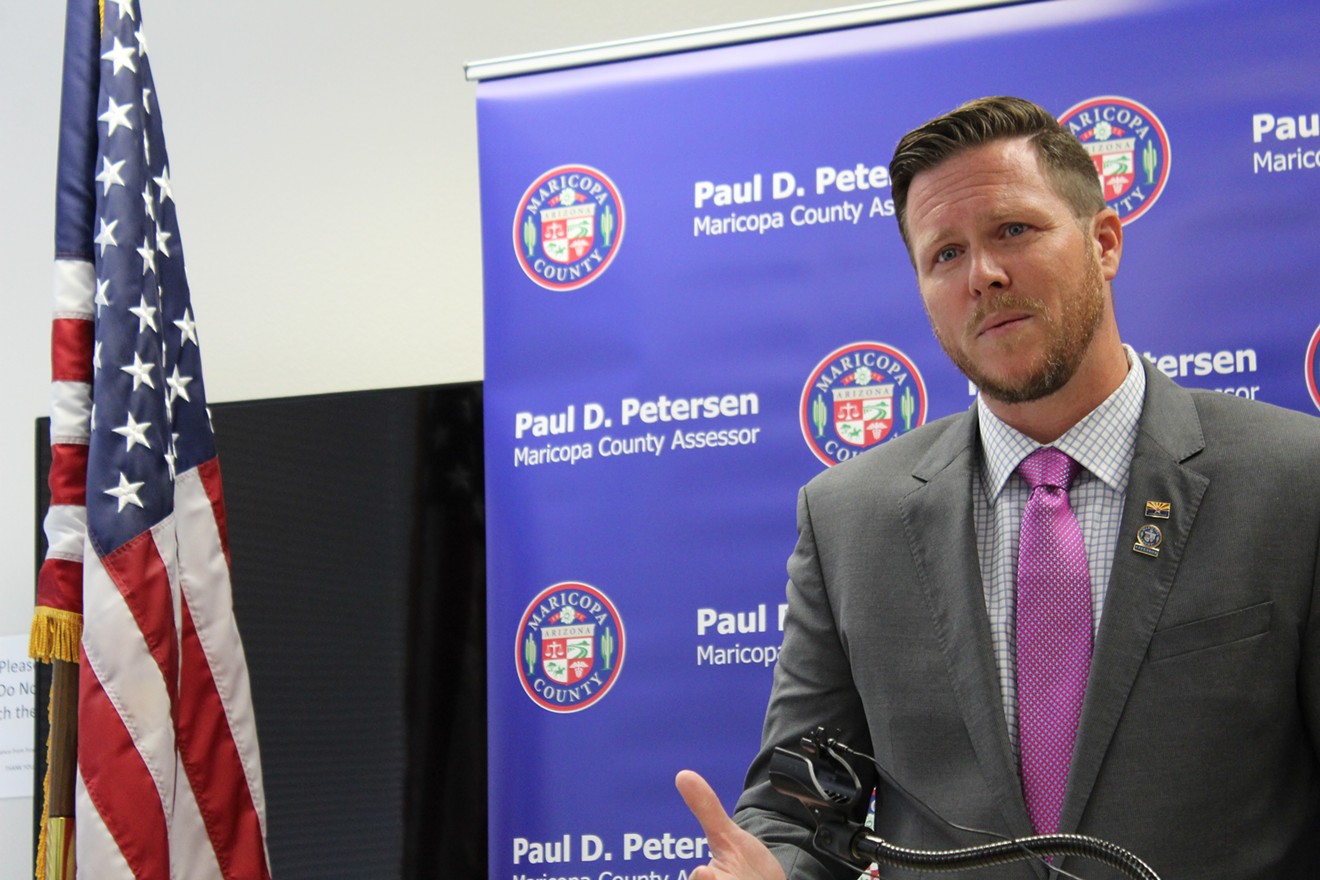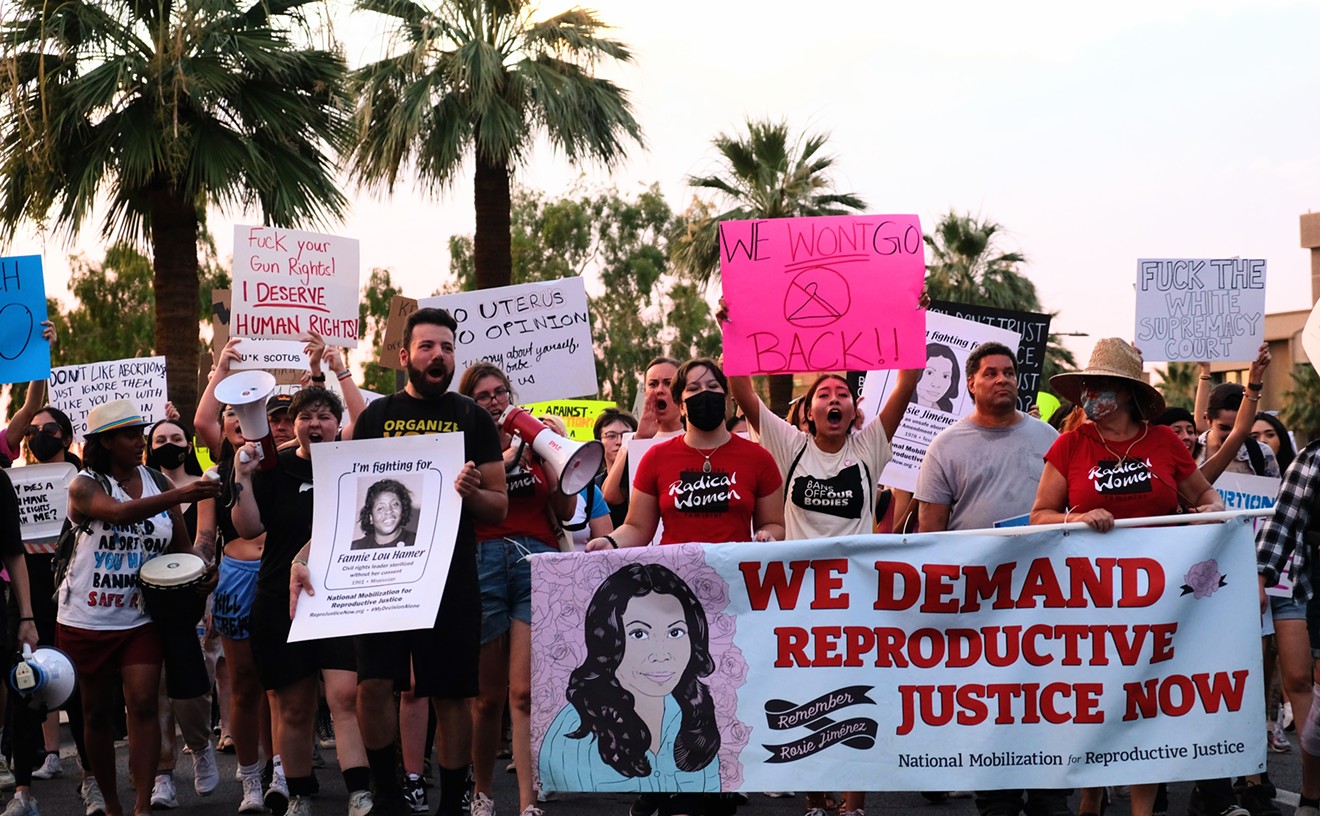Emails to the adoptive family from the director of Bright Star Adoptions, an adoption firm for which Petersen served as general counsel, suggest that concerns came up about the firm’s compliance with the Indian Child Welfare Act following Petersen's arrest.
The director, Linda Henning Gansler, wrote to the adoptive parents on October 12 that she retained a new lawyer in place of Petersen and assured them that the birth mother was still willing to move forward with the adoption.
She also wrote: “I do have to notify the tribe as that is proper procedure, [sic] we were given incorrect advice from Paul. this [sic] will happen this week."
The Indian Child Welfare Act is a federal law enacted in 1978 to prevent removals of Native children from tribal communities and to protect the due process rights of American Indian parents. The law stems from an ugly period in recent American history wherein government officials forcibly removed Native American children from reservations to assimilate them into white culture.
Upon reviewing language from the Bright Star Adoption contract obtained exclusively by New Times, multiple experts in Indian law told New Times the firm appears to have given bad legal advice. The contract states that the Indian Child Welfare Act did "not apply" in the adoption case, which is a false assertion, according to attorneys who spoke with New Times. Kathryn Fort, a professor of Indian law at Michigan State University, said the married couple looking to adopt a Native baby were "being taken advantage of" by Petersen's firm.
And the Colorado River Indian Tribes, the Native community affiliated with the birth mother in the Bright Star Adoptions case, released a statement to New Times expressing concern that the firm "may have failed to properly inform prospective adoptive parents about the application of [the Indian Child Welfare Act] or abide by the notice requirements."
Potential noncompliance with the Indian Child Welfare Act could open a new chapter in the sprawling, multistate investigation into Petersen’s alleged adoption practices. Petersen is likely to face additional scrutiny from law enforcement and tribes. In addition, his firm's apparent negligence in complying with the Indian Child Welfare Act could jeopardize at least one planned adoption.
It's unknown if Petersen's firm has been involved in other Native child placement cases.
Petersen's law office was raided earlier this month by state police in conjunction with his arrest. The adoption firm involved with the Native baby placement, Bright Star Adoptions, for which Petersen served as general counsel and majority owner, was not part of the police action.
Petersen faces charges in Arizona, Arkansas, and Utah, ranging from Medicaid fraud to human smuggling. Law enforcement officials allege that Petersen facilitated travel for around 70 women from the Marshall Islands in a manner that violated an international treaty. If convicted of his most serious alleged offenses, he could spend the rest of his life in prison.
Native American children are not currently in the scope of the Arizona Attorney General's case against Petersen, spokesperson Ryan Anderson said.
The county assessor, first appointed in 2013 and elected to a four-year term in 2016, so far has resisted bipartisan calls for him to resign from public office.
The Contract
Petersen was “95 percent owner” and served as general counsel of Bright Star Adoptions, wrote Gansler, his business partner, in the October 12 email correspondence obtained by New Times. Gansler did not respond to an email or voicemail seeking comment.Joel Sannes, an attorney representing Gansler, confirmed to New Times in an email that Petersen served as general counsel for Bright Star Adoptions. But Sannes said no operating agreement determines the ownership stake of Gansler and Petersen.
"It would be speculating to say what percentage interest Mr. Petersen believes Ms. Gansler has in Bright Star," Sannes wrote. "For her part, Ms. Gansler did not consider her membership interest to be a factor in her work at Bright Star. She was only paid as an employee during the period of a little more than a year since Bright Star has been operating."
The contract New Times obtained was sent from Bright Star Adoptions to the married couple looking to adopt a baby from a pregnant woman who appears to be enrolled as a member, or is eligible for membership, in the Colorado River Indian Tribes reservation, which spans parts of western Arizona and eastern California along the Colorado River.
The woman’s baby is due in December, records show.
Bright Star’s contract calls for the married couple to pay the firm $36,000 to facilitate their adoption. More than $10,000 of that cost would go toward paying for the birth mother’s living expenses, about $22,000 would go toward the firm, and $3,500 would cover a legal fee to terminate the parental rights of the birth mother and father, according to an expense report Bright Star sent to the adoptive parents along with the contract.
The contract, which is riddled with typos and grammatical errors, also states that the birth mother has “Native American ACCESS Medicaid,” possibly referring to the state's Medicaid program for Natives, the AHCCCS American Indian Health Program.
According to the September "agreement for adoption placement," Bright Star took the position that the birth mother "does not need to inform the tribe [of the planned adoption] because this is a voluntary placement."
The contract also stated that the Indian Child Welfare Act "does not apply in this adoption."
A copy of the contract, in which the names of the birth mother and adoptive parents have been redacted, follows:
Neither the birth mother nor the adoptive parents could be reached for comment.
Bright Star's contract raised concerns for attorneys specializing in the Indian Child Welfare Act, which outlines preferences for Native children to be placed within tribal communities.
Indian Child Welfare Act experts agreed that the Bright Star contract potentially misled the adoptive parents by saying the law “does not apply” in their situation.
“That is just wrong,” said Professor Fort, who also serves as director of the Indian Law Clinic at Michigan State University and authored a case law book titled American Indian Children and the Law.
She pointed to a section in the Indian Child Welfare Act that states the law does apply in adoptions of Native children. And she invoked a federal regulation published in 2016, which states that the Indian Child Welfare Act applies in any “voluntary proceeding that could prohibit the parent or Indian custodian from regaining custody of the child upon demand.”
In other words, the Indian Child Welfare Act applies in voluntary adoption cases when a Native birth mother gives up her parental rights. It’s unclear from the September Bright Star contract whether the birth mother agreed to give up her parental rights after the birth of her child.
But an email from Bright Star to the adoptive parents after Petersen’s arrest states that the agency found a new attorney to handle the birth mother’s “relinquishment,” a term for giving up parental rights.
Fort also took exception to the claim in the contract that the birth mother “does not need to inform the tribe because this is a voluntary placement.”
She said the Indian Child Welfare Act implicitly requires tribal notification in voluntary adoption cases because only a tribe can say whether a child would be eligible for membership, thereby allowing a court to determine whether the law applies.
Through her attorney, Gansler declined to comment on the planned adoption involving the Colorado River Indian Tribes.
"Because this question would require information regarding clients, it would be inappropriate to comment," said Sannes, the attorney representing Gansler.
He continued: "Ms. Gansler can state that if she believed an adoption required approval from a sovereign native nation, she would not have told a client that approval was not required, nor would she have had a client sign a contract that would say that approval is not necessary. Gansler is not an attorney, and in matters where there is a question whether the [Indian Child Welfare Act] may be applicable, she relies on legal advice from attorneys who practice adoption law. Mr. Petersen, in addition to being a member of Bright Star, was also Bright Star’s general legal counsel."
David Simmons, the director of government affairs and advocacy at the National Indian Child Welfare Association, agreed with Fort that the law implicitly requires tribal notification in cases of voluntary adoption.
“How do you get to determine whether a child is an Indian child? The adoption attorney is not in a good position to make a good determination,” Simmons said. "You should be contacting the tribe and ask if the child is a member.”
Even an adoption attorney who, in an ongoing constitutional debate over the Indian Child Welfare Act, leans on the side of a birth parent’s right to decide their child’s placement, said he had concerns about Bright Star’s contract language.
Jay McCarthy, a Flagstaff-based adoption attorney, said the contract’s blanket statement that the law “does not apply” should have included context that backed up the claim.
“It’s a red flag that the contract provided insufficient information to make such a statement. It should have said the child has Native American ancestry and a discussion of the Indian Child Welfare Act should occur to determine whether it is applicable,” McCarthy said.
But McCarthy disagrees with Fort and Simmons on whether Bright Star Adoptions or the birth mother had a legal obligation under the Indian Child Welfare Act to notify the tribe about the planned adoption.
McCarthy said notifying the tribe of an adoption could violate the birth parent’s privacy rights, and in such cases, the rights of a parent to decide the placement of their child supersedes the rights of tribes to intervene. In a phone interview, McCarthy expressed concern for the birth mother.
"This woman, I’m really scared for her, because she’s getting possibly incorrect advice," he said. "This poor woman needs to see a lawyer who knows this area of the law."
‘Taken Advantage’
On top of giving potentially misleading information on the Indian Child Welfare Act, the contract includes language to legally and financially protect Bright Star Adoptions if the adoption does not go through.A clause in the contract states that Bright Star “shall not be liable at law or in equity nor shall they bring, encourage, to be brought, or instigate any legal action in the event that said child is not ready or not available for adoption.”
The contract further states that “should the birth mother changed [sic] her mind and ask for the child back or discontinue adoption services prior to birth the adoptive couple loose [sic] the following fees. Legal expenses earned by attorneys, case work and counseling, living expenses and a $5,000.00 at risk agency fee.”
Fort said such language could become relevant if the tribe decides to contest the adoption, which could lead to a protracted legal battle.
"Frankly, the adoptive parents are being taken advantage of here. They put all this money up. They’re told by their attorney there shouldn’t be any hiccups and they’re being told Indian Child Welfare Act won’t apply,” the professor said. "They’re being lied to."
The Colorado River Indian Tribes indicated in a statement that tribal officials have been made aware of Bright Star’s planned adoption of a child who is potentially eligible for membership in the tribe. The statement also expressed concerns that the adoptive parents may not have been sufficiently advised on the Indian Child Welfare Act.
“This matter falls under the Indian Child Welfare Act,” the statement reads. “We are concerned that private adoption agencies may have failed to properly inform prospective adoptive parents about the application of this act or abide by the notice requirements. The [Colorado River Indian Tribes] take an active role in the application of the Indian Child Welfare Act and in all matters in which the Indian Child Welfare Act applies, including this most recent situation.”
Established in 1865, the Colorado River Indian Tribes reservation contains members from four distinct tribes: the Mohave, Chemehuevi, Hopi, and Navajo. There are more than 4,000 actively enrolled members, according to the tribe's website.
In 2017, the tribal council of the Colorado River Indian Tribes passed a resolution establishing an order of placement preferences for adoptions that offer more specificity than those outlined in the Indian Child Welfare Act. The resolution set a preference for children to be placed with the birth parents, followed by grandparents, extended family, other members of the Colorado River Indian Tribes, and finally, other Indian families.
In passing the resolution, the tribal council invoked a passage in the Indian Child Welfare Act that states "that there is no resource that is more vital to the continued existence and integrity of Indian tribes than their children and that the United States has a direct interest, as trustee, in protecting Indian children who are members of or are eligible for membership in an Indian tribe."

Arizona Attorney General Mark Brnovich announces 32 felony indictments against Petersen on October 9, 2019.
Steven Hsieh
The Indictments
The accusations against Petersen largely followed findings by Honolulu Civil Beat, a nonprofit Hawaiian news organization, in a blockbuster investigation published in late 2018.The Beat's findings sparked a months-long, multistate investigation, which culminated in an October 7 state grand jury indictment against Petersen on 32 felony counts related to his Marshall Islands adoption scheme.
Petersen and an accomplice, Lynwood Jennet, stand accused of illegally flying 29 Marshallese women to the United States for the express purpose of giving birth. Each woman got paid up to $10,000 to travel to the country, where they lived in houses owned by Petersen for months as they awaited giving birth.
State authorities also accused Petersen of falsely representing the women as Arizona residents to bilk $800,000 from Arizona taxpayers to pay for the women's health care costs.
"What Petersen is doing is frankly an affront to Arizona taxpayers,” Brnovich said during a press conference announcing the charges earlier this month. "It’s unfair to the adoptive parents and it’s also unfair to the hardworking Arizona taxpayer."
State troopers found eight pregnant women when they raided a Mesa home owned by Petersen.
Authorities in Utah and Arkansas filed more serious charges against Petersen.
The United States Attorney for the Western District of Arkansas charged the assessor on multiple federal counts of human smuggling and wire fraud, while Utah Attorney General Sean Reyes is pursuing charges of human smuggling, communications fraud, and sale of a child.
“The commercialism of children is illegal,” Utah Attorney General Sean Reyes said at his own news conference on October 9 announcing the charges. “And the commoditization of children is simply evil.”
Through an attorney, Petersen has denied wrongdoing related to his adoption practice.
"This was not human trafficking," attorney Matthew Long told the Salt Lake Tribune. "That's going to be borne out by evidence. That's going to be borne out by the manner in which it will be demonstrated that Mr. Petersen dealt with the birth mothers and the adopted families."
Long recently stepped down as Petersen's attorney. Petersen's new attorney, Kurt Altman, did not respond to request for comment.
Hilda Heine, the president of the Republic of the Marshall Islands, has applauded the arrest and criminal charges against Petersen, saying: "Marshallese women have been induced by people like Petersen and his ilk for too long."














